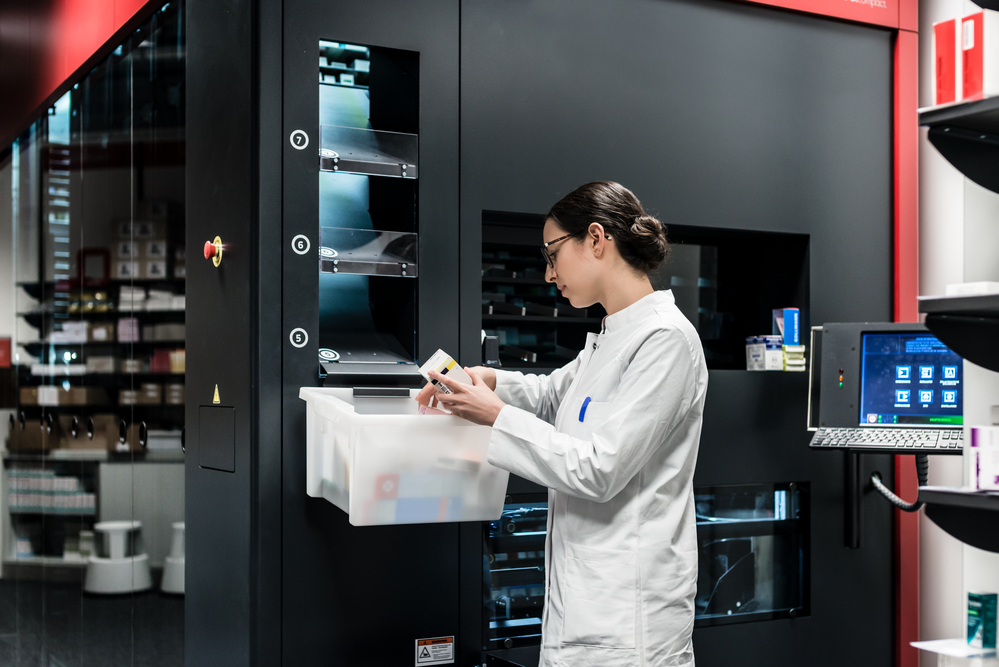The world is rapidly evolving, and technology has become an integral part of various industries, revolutionizing how we live and work. The healthcare industry is no exception, as technology continues to play an increasingly significant role in improving patient care and enhancing healthcare practices. Within healthcare, one field that has witnessed the transformative power of technology is pharmacy practice.
In this article, we will talk about the remarkable role of technology in pharmacy practice and examine its potential benefits for pharmacists. By recognizing the positive impact of technology in the practice of pharmacy, you can unlock new possibilities and opportunities to deliver exceptional patient care and drive innovation in the field. Join us as we explore some cutting-edge technologies that can be harnessed to achieve these transformative outcomes:
Electronic Prescribing (e-Prescribing):
This is the computerized process of generating and transmitting prescriptions for medications electronically. Physicians can now electronically send prescriptions directly to pharmacies, eliminating the need for paper prescriptions. One of the leading e-Prescribing networks in the United States is SureScripts, which enables efficient and secure communication of prescription details between healthcare providers and pharmacies, ensuring accurate and timely dispensing of medications.
This technological advancement not only enhances accuracy and reduces medication errors but also prioritizes patient safety and streamlines the prescription filling process.
Medication Dispensing Technologies
As a pharmacist, Medication Dispensing Technologies (MDTs) are advanced systems and devices that can greatly enhance your practice. These technologies automate various aspects of medication dispensing, making your workflow more efficient and precise. With MDTs, tasks such as medication counting, labeling, and packaging are automated, allowing you to spend more time focusing on patient care. MDTs also include barcode scanning devices and medication verification systems, ensuring accurate medication administration and reducing the risk of errors. An example of Medication Dispensing Technologies (MDTs) is the Pyxis MedStation system, which offers a range of features designed to enhance medication management for pharmacists in healthcare settings. User access control measures and comprehensive documentation capabilities enable secure and accountable medication handling. The system also integrates with electronic health records, facilitating seamless information exchange and promoting continuity of care.
Electronic Health Records (EHRs):
These are digital versions of patients' medical records that are accessible to authorized healthcare providers. EHRs store comprehensive patient information, including medical history, diagnoses, medications, allergies, lab results, and more. They serve as a centralized platform for healthcare professionals to view and update patient records, facilitating efficient and coordinated care. Specifically in pharmacy practice, EHRs offer several benefits. They enable pharmacists to access accurate and up-to-date medication lists, allowing for effective medication reconciliation and management. EHRs provide clinical decision support, alerting pharmacists to potential drug interactions, allergies, and dosage adjustments. They also support medication therapy management (MTM) by documenting interventions, monitoring drug therapy outcomes, and facilitating communication with other healthcare providers.
EHRs streamline prescription management processes by enabling electronic prescribing and refill requests, reducing errors, and improving efficiency. You, as a pharmacist, can also generate reports and analytics from EHR data to identify trends, assess medication utilization, and improve patient outcomes.
Telepharmacy and Remote Patient Monitoring
Telepharmacy and remote patient monitoring are innovative technologies that have transformed the way pharmacists provide care and monitor patients. As a pharmacist, telepharmacy is an innovative practice that allows you to provide remote pharmacy services using telecommunications technology. Through phone calls, video calls, or secure messaging, you can connect with patients, healthcare providers, and other team members to offer medication counseling, answer questions, review prescriptions, and provide medication therapy management.
For example, imagine a patient residing in a remote area with limited access to healthcare services. Through telepharmacy, the patient schedules a consultation with you, the pharmacist, using a secure telehealth platform. During the consultation, you review the patient's medical history, discuss medication management, answer questions, and provide counseling on lifestyle modifications. This remote interaction allows the patient to receive comprehensive care without the need for travel or proximity to a physical pharmacy.
In addition to telepharmacy, remote patient monitoring (RPM) plays a crucial role in this scenario. You provide the patient with RPM devices, such as wearable sensors or mobile apps, to collect real-time health data. The patient's vital signs, blood glucose levels, or other relevant health indicators are securely transmitted to you through the telehealth platform. This data can include vital signs, medication adherence, blood glucose levels, and other relevant health indicators. You can utilize RPM to assess the patient's progress, identify potential issues or trends, provide timely interventions, and collaborate with other healthcare providers to optimize care for the patient. RPM enhances patient engagement, promotes proactive care management, and improves patient outcomes by enabling continuous monitoring and early detection of health changes.
Future Trends in Technology in Pharmacy Practice
The future of pharmacy in the next ten years is likely to be shaped by several emerging trends and advancements in the healthcare industry. Here are some key aspects that could influence the future of pharmacy:
- Technological Advancements: Pharmacy practice is expected to become increasingly technology-driven. Automation and robotics will play a significant role in areas such as prescription dispensing, inventory management, and medication compounding. Digital health technologies, telepharmacy, and online platforms may also enhance patient care and accessibility to pharmaceutical services.
- Personalized Medicine: The field of pharmacogenomics, which focuses on how an individual's genetic makeup influences their response to medications, is advancing rapidly. In the future, pharmacists may play a crucial role in tailoring drug therapies based on a patient's genetic profile, leading to more effective and personalized treatment plans.
- Expanded Clinical Roles: Pharmacists are likely to take on more clinical responsibilities, working collaboratively with other healthcare professionals. They may be involved in medication therapy management, conducting health screenings, providing immunizations, managing chronic conditions, and offering medication counseling. This shift will enable pharmacists to have a more direct impact on patient outcomes.
- Enhanced Patient Engagement: As healthcare becomes more patient-centred, pharmacists will focus on promoting medication adherence, patient education, and counseling. They will play an active role in helping patients understand their medications, potential side effects, and lifestyle modifications necessary for optimal therapeutic outcomes.
- Remote Healthcare Services: The COVID-19 pandemic accelerated the adoption of telehealth services, and this trend is expected to continue. Pharmacists may provide remote consultations, medication reviews, and virtual counseling sessions to ensure continuity of care, especially in underserved areas or for patients with limited mobility.
- Expanded Scope of Practice: Regulatory changes and policy reforms may broaden the scope of practice for pharmacists, allowing them to prescribe certain medications, order laboratory tests, and make therapeutic adjustments. These changes will enable pharmacists to work more autonomously and contribute to the overall healthcare system.
- Data Analytics and Artificial Intelligence: With the increasing availability of healthcare data, pharmacists will leverage analytics and artificial intelligence to identify patterns, predict medication-related issues, and optimize treatment plans. These technologies can aid in medication safety, drug interactions, and population health management.
- Focus on Preventive Care: In addition to traditional roles, pharmacists will likely emphasize preventive care and public health initiatives. They may offer vaccinations, health screenings, and wellness programs to promote healthy lifestyles and disease prevention.
Conclusion
The future of global health will no longer differentiate between traditional health and digital health; instead, it will simply be referred to as "Health." Digital technology will play a fundamental role in shaping this future, making it imperative for pharmacists to lead this transformation. By wholeheartedly embracing digital offerings, collaborating with patients and healthcare providers, and staying at the forefront of technological advancements, pharmacists can position themselves as exemplary leaders in delivering exceptional patient care. In this endeavor, pharmacy owners play a crucial role by supporting their pharmacists' digital adaptation by providing training, and resources, and creating a conducive work environment, thus empowering them to effectively leverage technology.
At Verovian Healthcare Recruitment Agency, we take pride in being a forward-thinking organization that recognizes the pivotal role of digital technology in shaping the future of pharmacy. Discover a partnership with us, and gain access to skilled and innovative pharmacists who go beyond pharmaceutical expertise. Our commitment lies in connecting you with candidates who demonstrate profound dedication to continuous learning and staying at the forefront of emerging trends, ensuring your organization thrives in the ever-evolving landscape of pharmacy practice. Also, if you’re looking for new opportunities in pharmacy practice, our priority is to connect you with organizations that fully support your digital adaptation journey, offering valuable training, abundant resources, and a conducive work environment.





